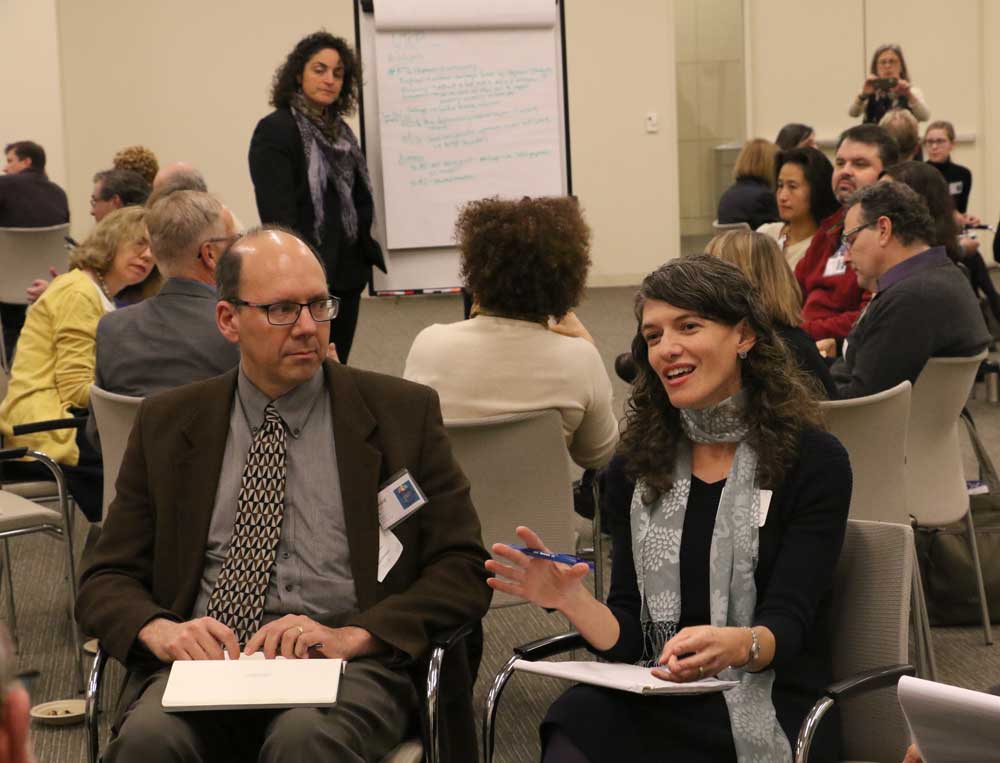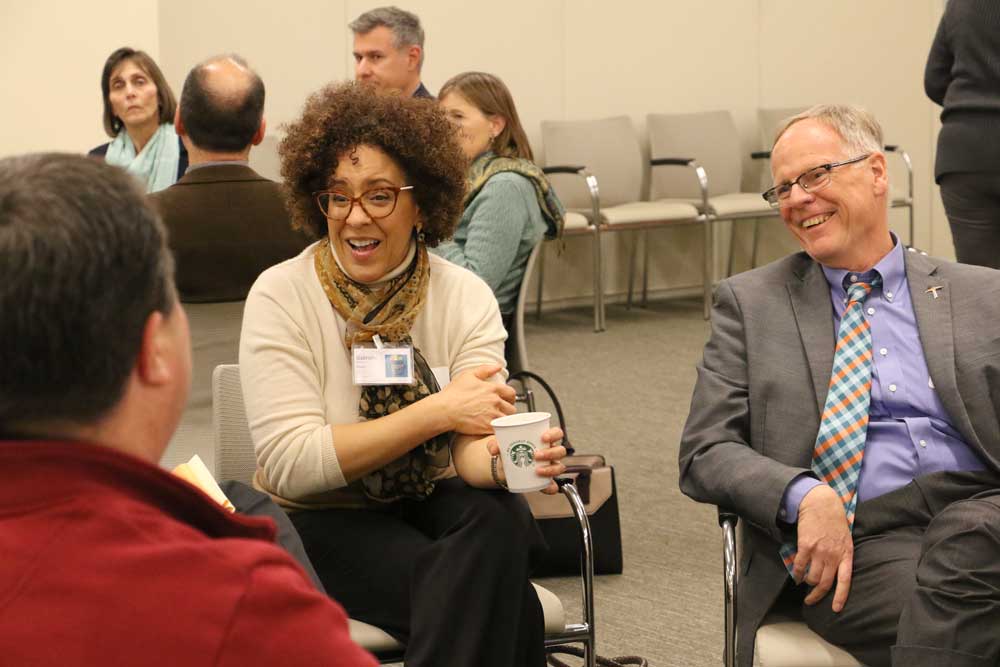By Edward Balleisen
Vice Provost for Interdisciplinary Studies
Maria LaMonaca Wisdom
Director of Graduate Student Advising and Engagement in the Humanities

Duke’s Edward Balleisen and Maria LaMonaca Wisdom represented Duke at January’s meeting of program directors from universities receiving an NEH Next Generation grant.
Versatile Humanists at Duke is part of a much larger movement to reconfigure humanities doctoral education for the twenty-first century. Although VH@Duke focuses on approaches to doctoral training among our own Ph.D. students and faculty, the program aspires to be a national model for innovations in humanities graduate training. Across the United States, many humanists are rethinking such matters, thanks in large part to the support of both the Mellon Foundation (Connected Academics, Career Diversity for Historians) and the National Endowment for the Humanities (Next Generation Ph.D.).
Late last month, we took part in this larger, national conversation at a program directors’ meeting for the twenty-eight universities currently receiving an NEH Next Generation planning or implementation grant. Despite substantial geographical, structural, and programmatic diversity, some key themes and commonalties emerged over a full day’s worth of discussion.
The NEH project leaders highlighted a cluster of priority action items for Ph.D. training. Almost all fell into one of three categories: enhanced professional training for humanities Ph.D. students, curricular innovations, or strategies to cultivate faculty buy-in.
What Other Universities and Duke Are Doing
Professional development initiatives underway or in the planning stages include efforts to promote greater awareness of non-faculty career alternatives, improve advising, provide workshops on concrete skills such as resume-writing and networking, provide non-academic internship opportunities, and foster mentoring between alumni professionals and Ph.D. students.
Curricular change poses more daunting challenges and perhaps greater risks. Fewer schools were actively engaged in such efforts, but projects at schools such as the University of Delaware and the University of Colorado Boulder are raising fundamental questions about what a twenty-first-century humanities Ph.D. program might look like. Both schools are transforming existing Ph.D. programs through deeper interdisciplinary networks, new forms of scholarly production (including digital products and public outreach), collaborative research that involves partnerships with organizations outside the university, and greater flexibility in the structure and form of dissertations.

Gabrielle Foreman, Colored Conventions Project Director for the Next Generation Interdisciplinary Initiative in African American Public Humanities at the University of Delaware.
The three universities that received NEH implementation grants have taken distinctive tacks with regard to professional development and curricular change. The University of Delaware’s grant targets a specific theme—the African American experience—while still incorporating concerns for facilitating career diversity, chiefly through internships and collaborative research projects with partner libraries and museums. The University of Chicago’s grant emphasizes the cultivation of professional development skills and the deepening of non-academic professional networks.
VH@Duke shares some features with both Chicago and Delaware. Like Chicago, we focus on improved advising for both faculty and non-academic career trajectories, better access for humanities Ph.D. students to off-campus internship opportunities, and stronger networks between graduate students and alumni. Like Delaware, we are looking to catalyze curricular experimentation, though in our case across the breadth of the humanities and interpretive social sciences. We are offering support to academic departments for the design and implementation of curricular innovations that make the most sense for their disciplines and Ph.D. programs. At the same time, we are striving to raise awareness among both faculty and graduate students about the value of interdisciplinary, problem-based, collaborative scholarship, and to increase the numbers of humanities graduate students who engage in these forms of scholarly inquiry through university-wide programs such as Bass Connections (which brings together faculty, students at all levels, and external partner organizations, on interdisciplinary research teams).
Challenges: Culture, Insecurity, Anxiety
The NEH meeting facilitated discussion of obstacles as well as early successes. Each campus was tasked with bringing a short list of tough issues they had already faced. As one might expect, many of those items were shaped by local campus cultures, institutional bureaucracies, and budgetary outlooks. Almost every program director, however, pointed to a general conservativism among many faculty and some students, as well as an environment of insecurity and anxiety.
There are, of course, no greater advocates for humanities training than the faculty who provide it and the students who pursue it. As project directors were quick to acknowledge, the reservations that they had encountered were most often characterized not by animosity, but by uncertainty or fear.
Humanities faculty worry about declining undergraduate enrollments and shrinking numbers of departmental lines. They also have concerns about maintaining the integrity and rigor of academic training within their disciplines. Many remain open to rethinking potential career paths for their students, but do not feel prepared to offer guidance of that sort.
Students confront a deeply unsettling future. On the same day as the NEH workshop, The Chronicle of Higher Education published an article quoting a humanities professor who described the academic job market as a “bloodbath.”
——- ♦ ——-
As for those students intrigued by other career paths, many “don’t even know what questions to ask” …
——- ♦ ——-
For many doctoral students, and many advisers, the small number of academic positions creates the need for even greater academic focus and even deeper specialization if students are to have any shot at a coveted tenure-track position. As for those students intrigued by other career paths, many “don’t even know what questions to ask,” as a Duke Ph.D. student confided to one of us recently.
Much of our discussion at the NEH zeroed in on the challenges of truly engaging faculty in the process of reform—the third, most elusive, and arguably most important channel of activity for Next Generation grantees. Several program directors are thinking about how to reimagine career development programs for humanities faculty so that they include preparation for a different type of mentoring. Everyone recognizes the need for community organizing—ongoing brainstorming with faculty about the intellectual benefits of a more outward facing approach to graduate training.
At Duke, we are also looking to open up opportunities for humanities faculty to take part in collaborative research along with graduate students (and undergraduates), to develop research partnerships with non-academic organizations, and to cultivate their own engagement with broader audiences. Such experiences, we believe, will give faculty a much better vantage point from which to advise students about the building blocks of intellectual versatility.
New Opportunities, Familiar Skills
Despite the widespread sense that the humanities now lack institutional moorings, we are struck by the range of fresh thinking emerging across the country. NEH and Mellon have offered critical resources for experimentation and cross-institutional learning. To seize those new opportunities, we must turn back to the skills on which the best humanities scholars have always prided themselves: open communication; tolerance for other points of view; ingenuity in research methods; the ability to think creatively, boldly, and across disciplinary lines; and the capacity to contextualize pressing societal controversies and problems.
At Duke, we find a growing conviction, across schools, departments, and institutes, that our doctoral students in the humanities and interpretive social sciences have much to offer, whether as future scholar-teachers in the academy or as leaders in cultural institutions, NGOs, government, or business.
——- ♦ ——-
We can sustain the best traditions of humanistic inquiry and teaching while adapting to new exigencies, new modes of research and expression, and new missions.
——- ♦ ——-
We also recognize that we have our work cut out for us. Over the next two-and-a-half years, VH@Duke must build out our experiments in supplemental advising, extended opportunities for internships and interdisciplinary project management, alumni networking, and curricular change. In addition, we need to assess the impacts of our efforts. To what extent, and how, will Duke Ph.D. students in the humanities and interpretive social sciences benefit from internship experiences? Will encounters with interdisciplinary, problem-centered research teams also generate new, more collaborative modes of scholarship, and different sorts of dissertations? Will our curricular innovations better prepare our students to speak to broad audiences? Will our undertakings in professional development and alumni networking assist our students in finding a wider set of career paths?
We look forward to many conversations with our faculty members and graduate students at Duke, as well as to engagement with our peer institutions that have committed themselves to reconsidering how we train the next generation of humanists.
For all the talk of a crisis in the humanities, we remain convinced that humanists have a critical role to play in our public life. And we remain confident that we can sustain the best traditions of humanistic inquiry and teaching while adapting to new exigencies, new modes of research and expression, and new missions. But that outcome depends on a collective commitment to a pragmatic mindset—a willingness, among faculty and students alike, to try new approaches, and to insist on careful evaluation of how they work.
